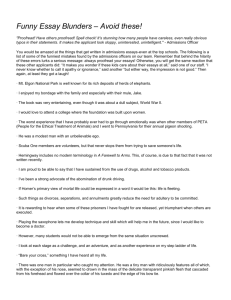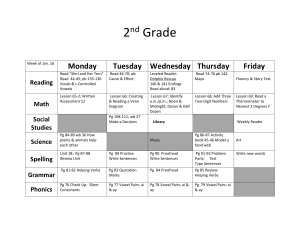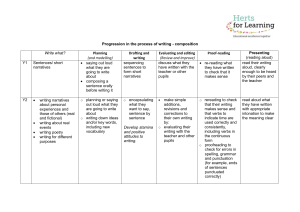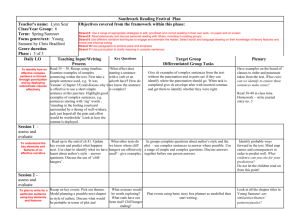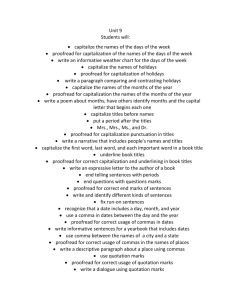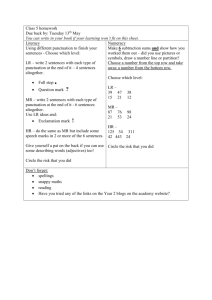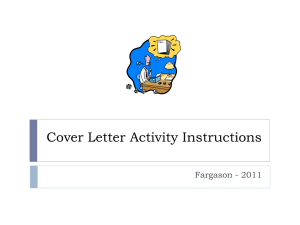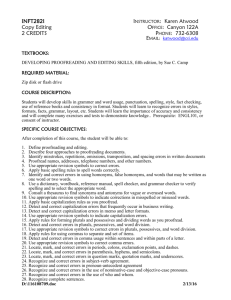UC010 CLASS HANDOUTS #1
advertisement
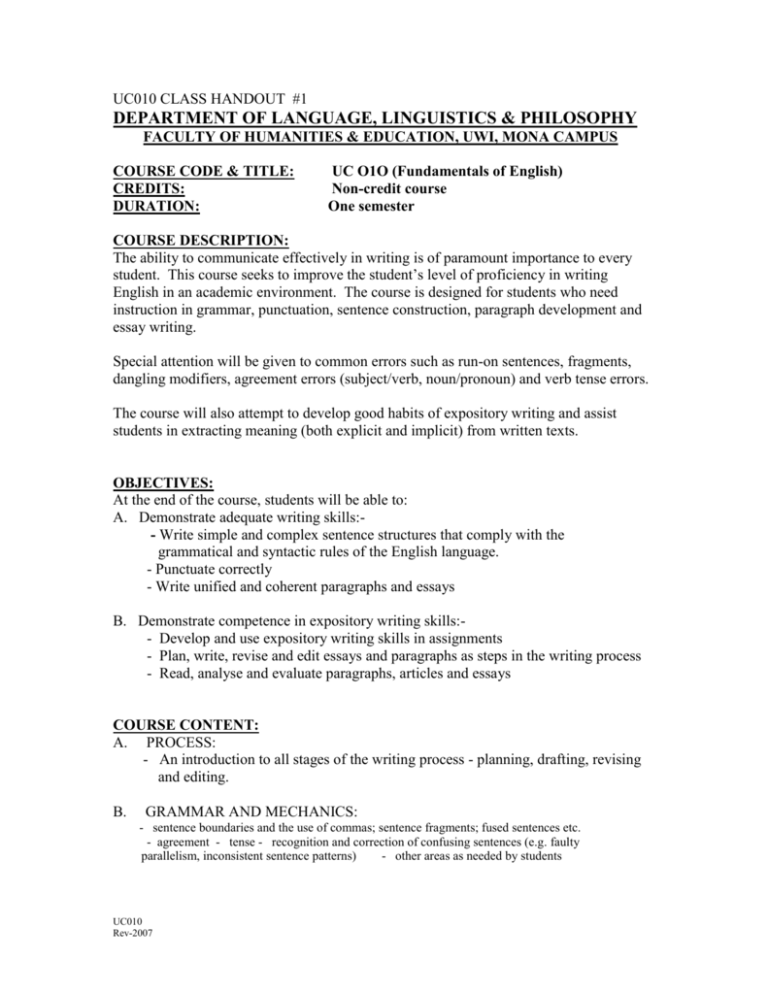
UC010 CLASS HANDOUT #1 DEPARTMENT OF LANGUAGE, LINGUISTICS & PHILOSOPHY FACULTY OF HUMANITIES & EDUCATION, UWI, MONA CAMPUS COURSE CODE & TITLE: CREDITS: DURATION: UC O1O (Fundamentals of English) Non-credit course One semester COURSE DESCRIPTION: The ability to communicate effectively in writing is of paramount importance to every student. This course seeks to improve the student’s level of proficiency in writing English in an academic environment. The course is designed for students who need instruction in grammar, punctuation, sentence construction, paragraph development and essay writing. Special attention will be given to common errors such as run-on sentences, fragments, dangling modifiers, agreement errors (subject/verb, noun/pronoun) and verb tense errors. The course will also attempt to develop good habits of expository writing and assist students in extracting meaning (both explicit and implicit) from written texts. OBJECTIVES: At the end of the course, students will be able to: A. Demonstrate adequate writing skills:- Write simple and complex sentence structures that comply with the grammatical and syntactic rules of the English language. - Punctuate correctly - Write unified and coherent paragraphs and essays B. Demonstrate competence in expository writing skills:- Develop and use expository writing skills in assignments - Plan, write, revise and edit essays and paragraphs as steps in the writing process - Read, analyse and evaluate paragraphs, articles and essays COURSE CONTENT: A. PROCESS: - An introduction to all stages of the writing process - planning, drafting, revising and editing. B. GRAMMAR AND MECHANICS: - sentence boundaries and the use of commas; sentence fragments; fused sentences etc. - agreement - tense - recognition and correction of confusing sentences (e.g. faulty parallelism, inconsistent sentence patterns) - other areas as needed by students UC010 Rev-2007 C. ORGANIZATION: - Using outlines and other pre-writing techniques - Introduction (including a clear thesis statement) and conclusion - Constructing topic sentences - focusing on one main idea in a paragraph - Using transitions and revising for unity, completeness and cohesiveness - Organising data. D. STYLE: - Writing with precision and without wordiness - Writing clearly and objectively - Recognising and correcting misused words - Recognising and replacing slang and contractions - Sentence variation and tone. E. EDITING AND REVISION SKILLS: - Supplying omitted words, deleting unnecessary words, etc - Correcting spelling, punctuation and grammatical errors - Revising to ensure cohesion F. CRITICAL READING, READING COMPREHENSION: - Extracting meaning from texts - Making inferences from reading material - Identifying purpose and thesis - Identifying main points and distinguishing them from supporting points - Developing vocabulary - Using own words to express main points INSTRUCTION: See handout #2 REQUIRED PURCHASE: UC O1O Course material (available from department) Dictionary RECOMMENDED PURCHASE: - Glazier, Teresa Ferster and Paige Wilson. The Least You Should Know About English: Writing Skills. Form A. 7th ed. Fort Worth: Harcourt College Publishers, 2000. - Hodge, Merle. The Knots in English, Massachusetts: Calaloux, 1997. - Morgan, Paula. Language Proficiency for Tertiary Level. St Agustine, Trinidad: UWIDEC, 1998. UC010 Rev-2007 UC 010 handout #2 DEPARTMENT OF LANGUAGE, LINGUISTICS & PHILOSOPHY UC O1O -- FUNDAMENTALS OF ENGLISH STUDENT INFORMATION SHEET CLASS ATTENDANCE: All students are required to attend two classes each week, one two-hour seminar and the corresponding 1-hour lab. Attendance is NOT optional, and an attendance record is kept. Should a student become ill, or obtain a borderline grade in the final exam, his/her attendance record becomes particularly important. NB Students who have been educated in a language other than English should identify themselves to their instructor in their first class. WRITING PORTFOLIOS: (developmental) (OPTIONAL) Throughout the course, students are advised to keep a writing portfolio. Portfolios should be brought to class each week and all written work should be dated and submitted for marking. The draft number should be written at the top of each entry. The portfolio should contain the following:a b c Three essays - minimum of five paragraphs each (approx. 500 words) - at least two drafts of each essay Three short pieces (minimum) plus drafts and redrafts (e.g. responses to newspaper or magazine editorials or other articles; letters to the editor etc.) Two self-assessment entries Students are encouraged to submit work of a high quality for publication in student magazines or journals. MOCK TEST (usually 1 or 2 weeks before the end of the course) COURSE MATERIAL: Each student is required to purchase the booklet produced by the Department. If you did not pay for the booklet when paying for the course, the procedure is as follows: To obtain your booklet: 1 Pay $500 to account #401514112 at NCB UWI, Mona. Fill out two (2) deposit slips, one of which must be stamped by the bank, and brought to the Department of Language, Linguistics & Philosophy 2 Room 16, Faculty of Humanities & Education. 3 Book will be given out at the first class. PLAGIARISM: Students found guilty of plagiarism in writing assignments for coursework and/or exams will be penalized. Please see “Cheating”, Item 73 in Examination Regulations for First Degrees & Certificates. UC010 Rev-2007 UC 010 handout #3 PROOFREADING: DEPARTMENT OF LANGUAGE, LINGUISTICS, & PHILOSOPHY UC 010 -- Fundamentals of English An Introduction Proofreading your paper is like giving yourself a final look in the mirror before you leave home to make sure that you look the way you want. It is the final step before you send your writing off to your audience. When you proofread, instead of reading to see what ideas have been expressed, you read looking for errors in grammar, spelling, and punctuation -- errors that might distract your readers. When should you proofread something you have written? You should do so when you are satisfied with its content and its style -- in other words, when you have a final draft. If you are working on a piece that you will not have the opportunity to rewrite, like an in-class essay, leave yourself about ten minutes at the end of the writing time for proofreading. Corrections of punctuation marks and individual words can be made neatly on a final copy; even an entire sentence can be inserted if there is room to write it. Only if you need to insert several sentences or to change the order of several sentences will it be necessary to recopy the manuscript. HOW TO PROOFREAD: To learn to proofread, you need to learn to read in a different way. Since you began learning to read as a child you have been taught to read for meaning: to focus on the idea behind the words more than on the words themselves. However, when you proofread, you need to do the opposite: to focus on the forms of your words and sentences instead of the meaning behind them. The following suggestions will help you to concentrate on FORM when you proofread: 1 Place a rule under each line as you read it. This practice isolates each line in turn and forces you to concentrate your attention on it. Professional proofreaders who help prepare copy for printing routinely use a rule when they proofread. You should always use a ruler to proofread. 2 Read your text in reverse order, beginning with the last paragraph. By reading out of order in this way, you are more likely to concentrate on the form of what you have written instead of on its meaning. 3 Read your writing aloud. When you read aloud, you slow your reading rate down, which will help you concentrate. Also, since your ear is more used to hearing standard forms than your eye is to seeing them, if you read your writing aloud, you will probably hear errors that you don’t see. This technique is especially useful for certain errors. If you tend to omit words, for instance, you catch these omissions if you read aloud, using your finger as a marker to ensure that you read only the words you have actually written. 4 Focus on your most common errors. It is overwhelming to search for every possible error you might make while writing. It is both easier and more efficient to concentrate on the errors you know you tend to make, since you are focusing on the areas in which you make 90 percent of your errors, instead of on those in which you make the remaining 10 percent. If there is one type of error that is a real problem for you, then proofread your paper once for that one error by itself. UC010 Rev-2007
